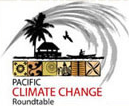The fifth Pacific Climate Change Roundtable (PCCR) aimed to, inter alia: update the region on the latest climate change science and finance issues and their implications for the region and the UNFCCC negotiations; review the implementation of, and share lessons learned from, the Pacific Islands Framework for Action on Climate Change (PIFACC) against agreed indicators in its monitoring and evaluation (M&E) framework; facilitate and provide mechanisms for strengthening networking, partnerships and collaborations among Pacific Island Countries; and discuss the new Strategy for Climate and Disaster Resilient Development Plan (SRDP).
 15 May 2015: The fifth Pacific Climate Change Roundtable (PCCR) aimed to, inter alia: update the region on the latest climate change science and finance issues and their implications for the region and the UNFCCC negotiations; review the implementation of, and share lessons learned from, the Pacific Islands Framework for Action on Climate Change (PIFACC) against agreed indicators in its monitoring and evaluation (M&E) framework; facilitate and provide mechanisms for strengthening networking, partnerships and collaborations among Pacific Island Countries; and discuss the new Strategy for Climate and Disaster Resilient Development Plan (SRDP).
15 May 2015: The fifth Pacific Climate Change Roundtable (PCCR) aimed to, inter alia: update the region on the latest climate change science and finance issues and their implications for the region and the UNFCCC negotiations; review the implementation of, and share lessons learned from, the Pacific Islands Framework for Action on Climate Change (PIFACC) against agreed indicators in its monitoring and evaluation (M&E) framework; facilitate and provide mechanisms for strengthening networking, partnerships and collaborations among Pacific Island Countries; and discuss the new Strategy for Climate and Disaster Resilient Development Plan (SRDP).
Over 200 delegates participated in the PCCR, which met from 12-14 May 2015, in Apia, Samoa. The Roundtable was followed by a closed preparatory meeting, held on 15 May, to discuss the UNFCCC negotiations for the Pacific Island Countries.
The PCCR also provided delegations to the Paris Climate Conference with relevant information to guide their decision making, and identified emerging gaps requiring priority action and necessary adjustments to existing activities to accommodate future priorities.
The regional SRDP, which the Pacific Islands are transitioning to, brings climate change and disaster risk management (DRM) together and is the world’s first such integrated strategy. It will encompass all climate change and natural disaster issues from 2015 onwards, when both the PIFACC and the Regional DRM Framework (RDRM) are set to expire, and will be presented at the Pacific Leaders Forum in Papua New Guinea in September 2015 for endorsement.
In his opening statement, David Sheppard, Director General, Secretariat of the Pacific Regional Environment Programme (SPREP), stated that integrated responses are critical in order to effectively address the challenges of climate change and natural disasters. He added that the roundtable would enable the charting of “a course for the future” and the building of new partnerships to better address climate change and natural disasters in the Pacific region. He said Pacific leaders have called on countries in Paris to commit to “the strongest legally binding targets to reduce greenhouse gas emissions,” and that work being undertaken in the region will be of limited value if a legally binding agreement cannot be achieved in Paris. He noted that SPREP was recently accredited to the Green Climate Fund (GCF), and expressed the hope to use this position to accelerate funding flows to Pacific countries.
Jean-Luc Faure-Tournaire, France, said his country hoped for a legally binding agreement that takes into account adaptation and mitigation, as well as loss and damage, and aims to move towards a low-carbon society.
The PCCR, which first convened in 2008, is a biannual meeting of regional and national governments, organizations and donors involved in climate change activities in the Pacific region that aims to ensure coordination among on climate-related efforts. The PCCR is coordinated by SPREP, in partnership with others, and with guidance from a steering committee. [PCCR Webpage] [SPREP Press Release, 12 May] [SPREP Press Release, 13 May] [SPREP Press Release, 15 May]